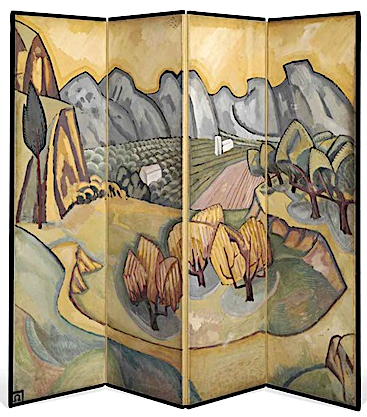ROGER FRY (1866 -1934)
Les Alpilles / Les Opies (496 m-1,627ft)
France (Provence)
In Les Alpilles - Provençal screen, 1913, Private collection
The mountains
The Alpilles massif is located in the south of France, in the Bouches-du-Rhône department (Provence-Alpes-Côte d'Azur region), about sixty kilometers north of Marseille. It extends along an east-west axis for about 25 km, from the Rhône valley to the Durance valley. Several summit areas make it up: - The main part of the massif, called the Alpilles (“Little Alps”), stretches from the Saint-Gabriel chapel in Tarascon to the road linking Aureille to Eygalières.
- Les Opies (496 m-1,627ft) east of the Alpille, is made up of three small peaks: the crêtes des Opies, Mont Menu and Défends (municipalities of Eyguières, Lamanon and Aureille).
- The Rochers de la Pène) are a narrow link stretching to the south of the massif from which it is separated by the departmental road 17 (Arles-Paradou) .
- Les Costières, located in the town of Saint-Martin-de-Crau, is a plateau that marks the southern limit of the massif. This one gains altitude as one progresses towards the north, and slopes steeply on the marshes of Baux, to the south of the rocks of Pène.
- Les Chainons are a set of low altitude peaks (around 50 meters) between Aureille and Montmajour characterized by the sets of valleys they shelter. The Caisses de Jean-Jean are perhaps the best known of those hills
The painter
Roger Eliot Fry was an English painter and critic, and a member of the Bloomsbury Group. Establishing his reputation as a scholar of the Old Masters, he became an advocate of more recent developments in French painting, to which he gave the name Post-Impressionism. He was the first figure to raise public awareness of modern art in Britain, and emphasised the formal properties of paintings over the "associated ideas" conjured in the viewer by their representational content. He was described by the art historian Kenneth Clark as "incomparably the greatest influence on taste since Ruskin ... In so far as taste can be changed by one man, it was changed by Roger Fry". The taste Fry influenced was primarily that of the Anglophone world, and his success lay largely in alerting an educated public to a compelling version of recent artistic developments of the Parisian avant-garde.
As a painter Fry was experimental (his work included a few abstracts), but his best pictures were straightforward naturalistic portraits, although he did not pretend to be a professional portrait - painter. In his art he explored his own sensations and gradually his own personal visions and attitudes asserted themselves. His work was considered to give pleasure, 'communicating the delight of unexpected beauty and which tempers the spectator's sense to a keener consciousness of its presence'. Fry did not consider himself a great artist, 'only a serious artist with some sensibility and taste'.
2020 - Wandering Vertexes...
by Francis Rousseau

No comments:
Post a Comment